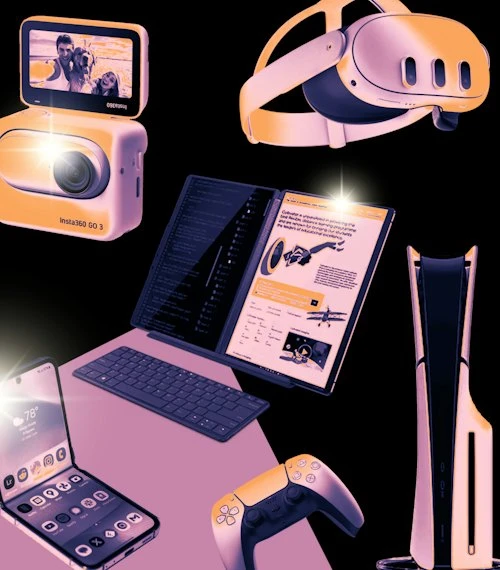Even though consumer tech companies played things pretty safe, there were still lots of innovative gadgets released this year.
These are the 25 top devices that moved the needle the most.
If you take a look at this list, you may conclude that consumer tech has stalled and innovation is less about big swings and moonshots and more about incremental updates to past form factors and ideas.
You’d be right.
But also wrong.
While it’s true that companies this year released products that played things safe, we’re on the cusp of some pretty seismic technology shifts.
Generative AI into devices, and we’re not even close to scratching the surface of what it can do now versus two, five, or even 10 years from now.
Gaming , , and than ever before thanks to more advanced headsets and the popularity of .
And more companies committed to efforts for and .
2023 might not be as memorable as 2007 when the iPhone launched and changed everything (though few products will ever reach that status), but it won’t be remembered as totally lackluster for tech releases, either.
Here’s ’s list of the best tech released this calendar year, based on how much impact think each product had.
25.
Chromebook Plus Quietly one of the most underrated tech products of the year, isn’t a single device as much as it is branding for a category of Chromebooks.
The badge mandates minimum “guaranteed specs” of at least an Intel Core i3 or AMD Ryzen 7000 series CPU, 8GB of RAM, 128GB of storage, a 1080p IPS screen, and a 1080p webcam.
In other words: Pretty much any Chromebook Plus runs well.
Best of all, most Chromebook Plus laptops are under $500, which makes them a sweet deal.
24.
Sony PlayStation VR 2 If you own a and have even a passing interest in VR gaming, the is the best (and only) way to get your fix on the console.
Sony still has much work to do beefing up its VR games library, but titles like , and show off the types of immersion you can get when your body is dropped right into a game.
23.
Opal Tadpole The comes from Opal, the maker of the .
Whereas the C1 webcam was made for desktops, the Tadpole was designed specifically for laptops.
Not only is the video quality the best we’ve ever seen in a webcam accessory, but it also has two features that other webcams don’t: The mic only picks up sound if it sees you in front of it, and the USB-C plug has a touchpad that, when tapped, physically mutes the mic.
Two wins for privacy.
22.
Framework Laptop 16 The modular and easy-to-repair design of the is hard to ignore if you’re eco-conscious and/or a tinkerer.
The Laptop 16 boasts a larger display compared with its , has room to add on a number pad, and has swappable GPU modules (one of many other upgradeable parts).
Nearly every component is repairable or replaceable.
It is in every way the anti-MacBook Pro — and proudly so.
21.
Samsung Galaxy Z Flip 5 There were to the .
Instead, Samsung focused on improving the little quality-of-life features like a gap-free design, a larger and , and faster performance.
Together, they add up to a flip-style foldable phone that’s even cuter and more usable than before.
20.
Polaroid I-2 With , it was only a matter of time before the .
is pricey, but with a three-element autofocusing lens for sharper details and better low-light performance, built-in manual controls, and a lidar sensor, there’s nothing like the I-2 on the market.
19.
Sony DualSense Edge Sony’s top-of-the-line is not a necessity to enjoy games on the PS5.
However, if you do want the extra customization — extra back buttons and paddles, swappable joysticks, and personalized controller profiles for specific games — the DualSense Edge is worth paying extra for.
It might even give you a competitive edge in some games.
18.
Sony ZV-1 II The surest is to not worry about your camera gear and settings and start recording yourself.
That’s why is so attractive — it makes vlogging super easy.
Compared to its predecessor, the second-gen ZV-1 has a lens that opens to a wider 18mm, so you can fit more into a shot; there’s a “Cinematic Vlog” setting that automatically makes footage more movie-like; and there are a bunch of AI features that help keep faces in frame and in focus.
17.
Ray-Ban Meta Smart Glasses Mark Zuckerberg believes that one day virtual and mixed-reality experiences will shrink enough to fit inside a pair of normal-looking glasses.
Until then, the best we have is the .
Meta improved everything — the fit, cameras, and sound — and added AI, so you can simply ask the assistant to help perform basic tasks you’d normally do on your phone.
Ray-Ban Meta Smart Glasses aren’t a phone replacement today, but they might just be the best glimpse of a more ambient computing experience that’s not so reliant on screens.
16.
Google Pixel Tablet Google’s first tablet in years is surprisingly good.
Rather than compete head-on with at being a , Google made the a smart home hub with the included detachable Charging Speaker Dock.
The combo essentially turns the Pixel Tablet into a Nest Hub Max when it’s not being used for tablet things like watching videos, web browsing, or playing games.
It’s a clever two-in-one idea that we think differentiates the tablet.
15.
Valve Steam Deck OLED The , and while it’s no , the delivers plenty of quality-of-life improvements.
The screen is a little larger at 7.
4 inches, and with OLED, blacks are inky dark and colors are more vibrant.
The display also tops out at 90Hz versus 60Hz, battery life lasts up to 50 percent longer, and Wi-Fi 6E allows for faster downloads.
It’s the Steam Deck everyone loves — but better.
14.
Sony PlayStation 5 Slim Three years after the PS5’s launch, Sony finally refreshed its fifth-gen home console with a “slim” model that has a smaller footprint (and more storage for the digital version).
The digital-only also supports an easy-to-install Blu-ray optical drive accessory should you want to add one to it later.
Kudos to Sony for moving the eject button to the optical drive, too, because mispressing it on the original PS5 drove us insane.
13.
Samsung Galaxy S23 Ultra Even with tons of competition, there was no phone with as much tech as .
Neither Apple nor Google’s flagship phones come with a built-in stylus, a wild 100x “Space Zoom,” or DeX mode, which allows the S23 Ultra to become a desktop-like computer experience when connected to a monitor, keyboard, and mouse.
Simply put: The S23 Ultra and is one of the few phones worthy of being called “ultra.
” 12.
DJI Mini 4 Pro The best camera is the one you have with you, and the same applies to drones.
and the is the best aerial camera for most consumers.
With a 249-gram weight (read: no drone license needed), excellent 4K/60 fps HDR video quality, and class-leading obstacle avoidance, the Mini 4 Pro balances features and convenience in a compact foldable design.
11.
Sonos Era 300 First came mono, then came stereo, and now there’s spatial audio, which adds a level of surround sound immersion previously only possible with multiple physical speakers.
Leading the spatial audio charge is the — the single speaker can fire 3D audio out of the six drivers located in the front, sides, and top.
It’s minimalist and easy to set up, and there’s no plug-and-play spatial audio speaker with comparable bass.
10.
Insta360 Go 3 Imagine a that can break apart with the camera and the display separating into two pieces but still functioning wirelessly.
That’s the in a nutshell.
Whether mounted in the main “Action Pod” or magnetically attached to the included accessories (i.
e.
, pendant or cap clip), the Go 3’s tiny form factor allows for recording unique points of view that previously were impossible.
It’s easily one of the most versatile new cameras we’ve seen in years.
9.
Sony PlayStation Access Controller for PS5 After announcing it back at CES 2023 as “ ,” Sony made good on its promise to launch the for the PS5.
As its name implies, the modular controller is designed for players with disabilities and can be configured in almost any layout with its swappable buttons and joystick caps.
With so many great titles released this year, the Access Controller couldn’t have come at a better time.
8.
Lenovo YogaBook 9i The is unlike any laptop we’ve ever used before.
As if having two 13.
3-inch 2.
8K-resolution touchscreens wasn’t already eye-catching enough, the laptop can also be rotated and used like a book.
Combined with a hinge that lets you rotate the screen 360 degrees and a wireless keyboard that changes function (a trackpad or a giant Touch Bar-like panel), the YogaBook 9i rethinks the laptop experience without completely shedding the traditional clamshell design.
7.
Apple iPhone 15 Pro / 15 Pro Max In previous years, the “pro” iPhones only seemed so in name.
This year, the pro in the actually means something — a titanium frame, a customizable , and , which can move data at up to 10 Gbit/s and save video to external storage.
The iPhone 15 Pros can also record video in LOG for color grading in post and for re-watching in .
Pretty pro, right? 6.
Nothing Ear 2 In a sea of wireless earbuds, one pair stood out: .
For the second-gen release, Nothing upgraded everything from the active noise-cancellation to the transparent case design to the sound quality and software.
With all the right ingredients and a price that undercuts more premium buds, the Ear 2 has barely any compromise.
5.
OnePlus Open The is, hands down, the best book-style foldable released this year.
With great dimensions folded and unfolded, innovative multi-app functionality, and excellent cameras, the Open outshines more established book-style foldables like the .
Not to mention, the price clocks in at less than the competition by a good amount, especially if you take advantage of OnePlus’ generous $200 trade-in program.
4.
Apple M3 Pro & M3 Max MacBook Pros Don’t let its 2-year-old clamshell design fool you because are the .
Once again, Apple has shown that its custom silicon smokes other laptops on performance while using less power.
Features like hardware-accelerated ray tracing open the door for console-quality gaming and the new colorway also adds to the laptop’s appeal.
3.
Google Pixel 8 & 8 Pro If the future of phones includes deep integration with AI, then and are ahead of the pack.
Google’s eighth-generation Android phones not only look and feel premium; they .
Whether it’s swapping a face in a photo with Best Take, summarizing web pages, or relying on natural language voice and text commands (via Assistant with Bard in a future software update) to regular phone things, the Pixel 8 and 8 Pro lean hard into generative AI as a new way of mobile computing.
2.
Asus ROG Ally Arguably the best competitor to the Steam Deck, one-ups Valve’s handheld in several ways.
It’s more compact, has a higher resolution 1080p display with a higher 120Hz refresh rate, has a more powerful AMD Ryzen Z1 Extreme processor, and .
With the right tweaked settings, there are very few PC games that the ROG Ally can’t play well.
More than anything, the ROG Ally proves is not only possible but can be a terrific experience.
1.
Meta Quest 3 If there was any single device that captured the imagination of almost everyone in 2023, it was .
The headset at a relatively affordable price and the momentum hasn’t slowed down.
Months after its release, developers and hobbyists big and small continue to blow people’s minds with their mixed reality creativity.
We’ve seen everything from playing , to , to .
Some companies, like , the makers of the , the future of computing should be on the face.
While putting screens closer to our eyeballs , they argue that we will also become more isolated if we choose to live behind a headset.
That may be true, and it’ll be up to us consumers to decide with our wallets whether we want headset computers or not, but it’s also true that Big Tech is pushing forward with this future one way or another.
The Quest 3 gave us all a taste of mixed reality, but the coming out in could be the device that legitimizes our face-worn computers.
Source: inverse








No Comments